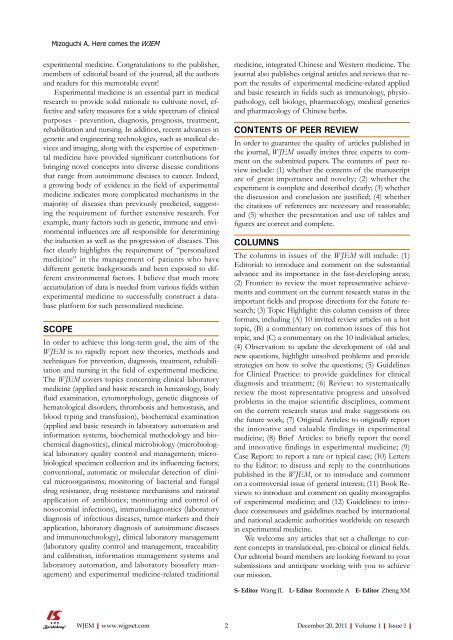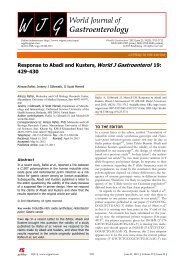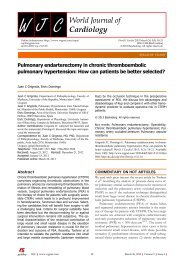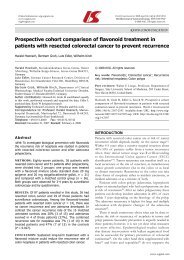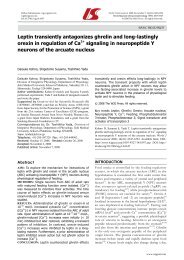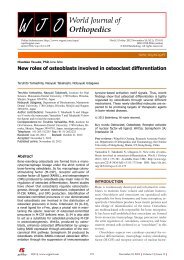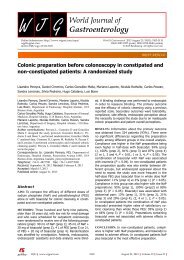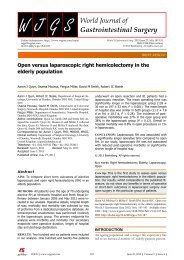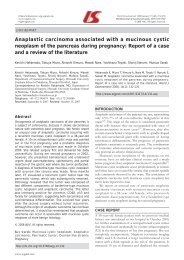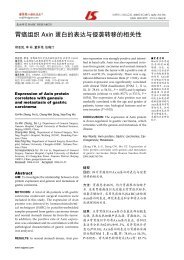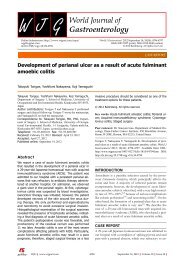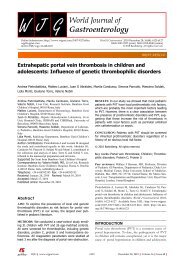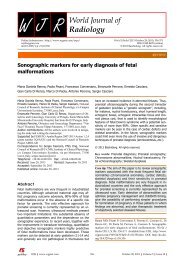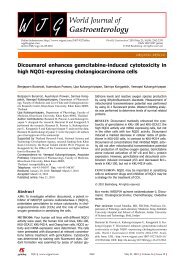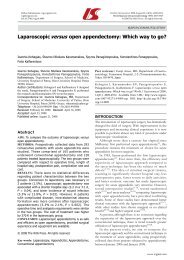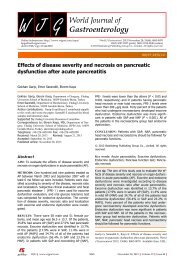World Journal of Experimental Medicine
World Journal of Experimental Medicine
World Journal of Experimental Medicine
You also want an ePaper? Increase the reach of your titles
YUMPU automatically turns print PDFs into web optimized ePapers that Google loves.
Mizoguchi A. Here comes the WJEM<br />
experimental medicine. Congratulations to the publisher,<br />
members <strong>of</strong> editorial board <strong>of</strong> the journal, all the authors<br />
and readers for this memorable event!<br />
<strong>Experimental</strong> medicine is an essential part in medical<br />
research to provide solid rationale to cultivate novel, effective<br />
and safety measures for a wide spectrum <strong>of</strong> clinical<br />
purposes - prevention, diagnosis, prognosis, treatment,<br />
rehabilitation and nursing. In addition, recent advances in<br />
genetic and engineering technologies, such as medical devices<br />
and imaging, along with the expertise <strong>of</strong> experimental<br />
medicine have provided significant contributions for<br />
bringing novel concepts into diverse disease conditions<br />
that range from autoimmune diseases to cancer. Indeed,<br />
a growing body <strong>of</strong> evidence in the field <strong>of</strong> experimental<br />
medicine indicates more complicated mechanisms in the<br />
majority <strong>of</strong> diseases than previously predicted, suggesting<br />
the requirement <strong>of</strong> further extensive research. For<br />
example, many factors such as genetic, immune and environmental<br />
influences are all responsible for determining<br />
the induction as well as the progression <strong>of</strong> diseases. This<br />
fact clearly highlights the requirement <strong>of</strong> “personalized<br />
medicine” in the management <strong>of</strong> patients who have<br />
different genetic backgrounds and been exposed to different<br />
environmental factors. I believe that much more<br />
accumulation <strong>of</strong> data is needed from various fields within<br />
experimental medicine to successfully construct a database<br />
platform for such personalized medicine.<br />
SCOPE<br />
In order to achieve this long-term goal, the aim <strong>of</strong> the<br />
WJEM is to rapidly report new theories, methods and<br />
techniques for prevention, diagnosis, treatment, rehabilitation<br />
and nursing in the field <strong>of</strong> experimental medicine.<br />
The WJEM covers topics concerning clinical laboratory<br />
medicine (applied and basic research in hematology, body<br />
fluid examination, cytomorphology, genetic diagnosis <strong>of</strong><br />
hematological disorders, thrombosis and hemostasis, and<br />
blood typing and transfusion), biochemical examination<br />
(applied and basic research in laboratory automation and<br />
information systems, biochemical methodology and biochemical<br />
diagnostics), clinical microbiology (microbiological<br />
laboratory quality control and management; microbiological<br />
specimen collection and its influencing factors;<br />
conventional, automatic or molecular detection <strong>of</strong> clinical<br />
microorganisms; monitoring <strong>of</strong> bacterial and fungal<br />
drug resistance, drug resistance mechanisms and rational<br />
application <strong>of</strong> antibiotics; monitoring and control <strong>of</strong><br />
nosocomial infections), immunodiagnostics (laboratory<br />
diagnosis <strong>of</strong> infectious diseases, tumor markers and their<br />
application, laboratory diagnosis <strong>of</strong> autoimmune diseases<br />
and immunotechnology), clinical laboratory management<br />
(laboratory quality control and management, traceability<br />
and calibration, information management systems and<br />
laboratory automation, and laboratory biosafety management)<br />
and experimental medicine-related traditional<br />
WJEM|www.wjgnet.com<br />
medicine, integrated Chinese and Western medicine. The<br />
journal also publishes original articles and reviews that report<br />
the results <strong>of</strong> experimental medicine-related applied<br />
and basic research in fields such as immunology, physiopathology,<br />
cell biology, pharmacology, medical genetics<br />
and pharmacology <strong>of</strong> Chinese herbs.<br />
CONTENTS OF PEER REVIEW<br />
In order to guarantee the quality <strong>of</strong> articles published in<br />
the journal, WJEM usually invites three experts to comment<br />
on the submitted papers. The contents <strong>of</strong> peer review<br />
include: (1) whether the contents <strong>of</strong> the manuscript<br />
are <strong>of</strong> great importance and novelty; (2) whether the<br />
experiment is complete and described clearly; (3) whether<br />
the discussion and conclusion are justified; (4) whether<br />
the citations <strong>of</strong> references are necessary and reasonable;<br />
and (5) whether the presentation and use <strong>of</strong> tables and<br />
figures are correct and complete.<br />
COLUMNS<br />
The columns in issues <strong>of</strong> the WJEM will include: (1)<br />
Editorial: to introduce and comment on the substantial<br />
advance and its importance in the fast-developing areas;<br />
(2) Frontier: to review the most representative achievements<br />
and comment on the current research status in the<br />
important fields and propose directions for the future research;<br />
(3) Topic Highlight: this column consists <strong>of</strong> three<br />
formats, including (A) 10 invited review articles on a hot<br />
topic, (B) a commentary on common issues <strong>of</strong> this hot<br />
topic, and (C) a commentary on the 10 individual articles;<br />
(4) Observation: to update the development <strong>of</strong> old and<br />
new questions, highlight unsolved problems and provide<br />
strategies on how to solve the questions; (5) Guidelines<br />
for Clinical Practice: to provide guidelines for clinical<br />
diagnosis and treatment; (6) Review: to systematically<br />
review the most representative progress and unsolved<br />
problems in the major scientific disciplines, comment<br />
on the current research status and make suggestions on<br />
the future work; (7) Original Articles: to originally report<br />
the innovative and valuable findings in experimental<br />
medicine; (8) Brief Articles: to briefly report the novel<br />
and innovative findings in experimental medicine; (9)<br />
Case Report: to report a rare or typical case; (10) Letters<br />
to the Editor: to discuss and reply to the contributions<br />
published in the WJEM, or to introduce and comment<br />
on a controversial issue <strong>of</strong> general interest; (11) Book Reviews:<br />
to introduce and comment on quality monographs<br />
<strong>of</strong> experimental medicine; and (12) Guidelines: to introduce<br />
consensuses and guidelines reached by international<br />
and national academic authorities worldwide on research<br />
in experimental medicine.<br />
We welcome any articles that set a challenge to current<br />
concepts in translational, pre-clinical or clinical fields.<br />
Our editorial board members are looking forward to your<br />
submissions and anticipate working with you to achieve<br />
our mission.<br />
S- Editor Wang JL L- Editor Roemmele A E- Editor Zheng XM<br />
2 December 20, 2011|Volume 1|Issue 1|


